Related Research Articles

"Funky Drummer" is a single released by James Brown in 1970. Its drum break, improvised by Clyde Stubblefield, is one of the most frequently sampled music recordings.
"Soul Power" is a song by James Brown. Brown recorded it with the original J.B.'s and it was released as a three-part single in 1971. Like "Get Up Sex Machine" and other hits from this period it features backing vocals by Bobby Byrd. It charted #3 R&B and #29 Pop.
"There Was a Time" is a song written and performed by James Brown.
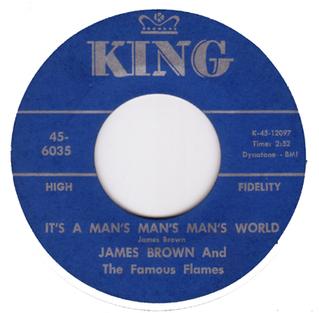
"It's a Man's Man's Man's World" is a song written by James Brown and Betty Jean Newsome. Brown recorded it on February 16, 1966, in a New York City studio and released it as a single later that year. It reached No. 1 on the Billboard R&B chart and No. 8 on the Billboard Hot 100. Its title is a word play on the 1963 comedy film It's a Mad, Mad, Mad, Mad World.
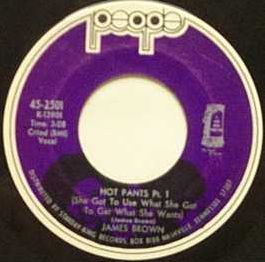
"Hot Pants " is a funk song by James Brown. Brown recorded the song in 1971 and released it that year as a three-part single on his People Records label, which was then distributed by his primary label King. It was a number-one R&B hit and reached number fifteen on the Billboard Hot 100 pop chart in the U.S. along with reaching number ten on the Cashbox magazine charts. "Hot Pants" was Brown's final release under King's purview before he moved to Polydor Records. The song's lyrics are an ode to the captivating power of the title garment, which members of the band first saw on their 1970 European tour.
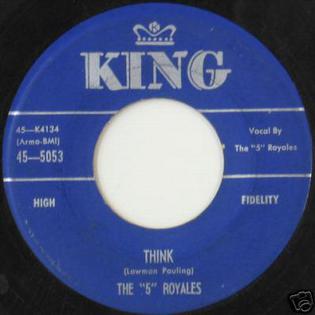
"Think" is a rhythm and blues song written by Lowman Pauling and originally recorded by his group The "5" Royales. Released as a single on King Records in 1957, it was a national hit and reached number nine on the U.S. R&B chart.

"Get on the Good Foot" is a funk song performed by James Brown. It was released in 1972 as a two-part single that charted #1 R&B and #18 Pop. It also appeared on an album of the same name released that year. Partly due to the unwillingness of Brown's record labels to certify sales of his previous hits, "Get on the Good Foot" was his first gold record. Billboard ranked it as the No. 99 song for 1972.
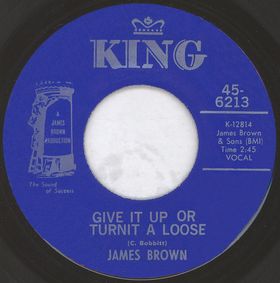
"Give It Up or Turnit a Loose" is a funk song recorded by James Brown. Released as a single in 1969, the song was a #1 R&B hit and also made the top 20 pop singles chart. "Give It Up or Turnit a Loose" appeared as an instrumental on the Ain't It Funky (1970) album, removing Brown's vocals and adding guitar overdubs, while the vocal version was released on It's a New Day – Let a Man Come In (1970).
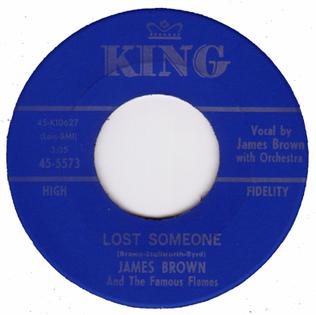
"Lost Someone" is a song recorded by James Brown in 1961. It was written by Brown and Famous Flames members Bobby Byrd and Baby Lloyd Stallworth. Like "Please, Please, Please" before it, the song's lyrics combine a lament for lost love with a plea for forgiveness. The single was a #2 R&B hit and reached #48 on the pop chart. According to Brown, "Lost Someone" is based on the chord changes of the Conway Twitty song "It's Only Make Believe". Although Brown's vocal group, The Famous Flames did not actually sing on this tune, two of them, Bobby Byrd, and "Baby Lloyd " Stallworth, co-wrote it with Brown, and Byrd plays organ on the record, making it, in effect, a James Brown/Famous Flames recording.

"Out of Sight" is a funk song recorded by James Brown in 1964. A twelve-bar blues written by Brown under the pseudonym "Ted Wright", the stuttering, staccato dance rhythms and blasting horn section riffs of its instrumental arrangement were an important evolutionary step in the development of funk music.
"Licking Stick – Licking Stick" is a song written by James Brown, Bobby Byrd, and Alfred "Pee Wee" Ellis and recorded by Brown as a two-part single in 1968. Byrd provides backing vocals on the song. It was the first stereo single release by King Records. The song was included on the album Say It Loud – I'm Black and I'm Proud.
"My Thang" is a funk song written and recorded by James Brown. Unlike most of his songs, this song was released not as a two-part single, but instead issued with three different B-sides. It spent two weeks at number one on the R&B singles chart - Brown's second #1 in a row, following "The Payback" - and reached No. 29 on the Billboard Hot 100 in July 1974. The song also appeared on Brown's 1974 double album Hell.
"Talkin' Loud and Sayin' Nothing" is a funk song written by James Brown and Bobby Byrd. Recorded in 1970 by Brown and the original J.B.'s with Byrd on backing vocals and updated with a new melody, it was twice released as a two-part single in 1972. It also appeared on the album There It Is.
"I'll Go Crazy" is a rhythm and blues song recorded by James Brown and The Famous Flames. Released as a single in 1960, it was Brown's fourth R&B hit, charting at #15. Brown and the Flames also performed it as the first song on their 1963 album Live at the Apollo.
"Maybe the Last Time" is a song written by James Brown and recorded by Brown and the Famous Flames in 1964. It was released as the B-side of "Out of Sight" and was also included on the Out of Sight album. Brown described it as "a heavy gospel-based number, all about appreciating friends and everything while you can because each time you see somebody may be the last time, you don't know." It was the last studio recording Brown made with the Famous Flames, although the singing group continued to perform live with him for several more years.
"Let Yourself Go" is a 1967 song by James Brown.
"Get It Together" is a song performed by James Brown. Released in October 1967 as a two-part single, it charted #11 R&B and #40 Pop. Both parts also appeared on the album I Can't Stand Myself When You Touch Me. Donald A. Guarisco of Allmusic described the song as "a taut, minimalist tune that combines soulful but frantically paced verse melodies with a bubbling, two-note staccato chorus."
"Money Won't Change You" is a song recorded by James Brown in 1966. It was released in edited form as a two-part single which charted #11 R&B and #53 Pop. Both parts of the single were included on Brown's 1967 album Sings Raw Soul.
"Don't Be a Dropout" is a song written by Burt Jones and recorded by James Brown. It was Brown's first attempt at a socially conscious song, encouraging teenagers to stay in school. Released as a single in 1966, it charted #4 R&B and #50 Pop. It also appeared on the album Sings Raw Soul. Bobby Byrd, Vicki Anderson, and The Jewels contribute backing vocals. The song led to Brown meeting with Vice President Hubert Humphrey, who had been working on a stay-in-school program of his own.
"Bring It Up", also known as "Bring It Up ", is a song recorded by James Brown. It was released as a single in 1967 and charted #7 R&B and #29 Pop. It also appeared on the album James Brown Sings Raw Soul. An unedited version of the song was released on the 1991 box set Star Time.
References
- ↑ White, Cliff (1991). "Discography". In Star Time (pp. 54–59) [CD booklet]. New York: PolyGram Records.
- ↑ Leeds, Alan, and Harry Weinger (1991). "Star Time: Song by Song". In Star Time (pp. 46–53) [CD booklet]. New York: PolyGram Records.
- ↑ "CashBox Record Reviews" (PDF). Cash Box. February 19, 1966. p. 20. Retrieved 2022-01-12.
- ↑ Youtube